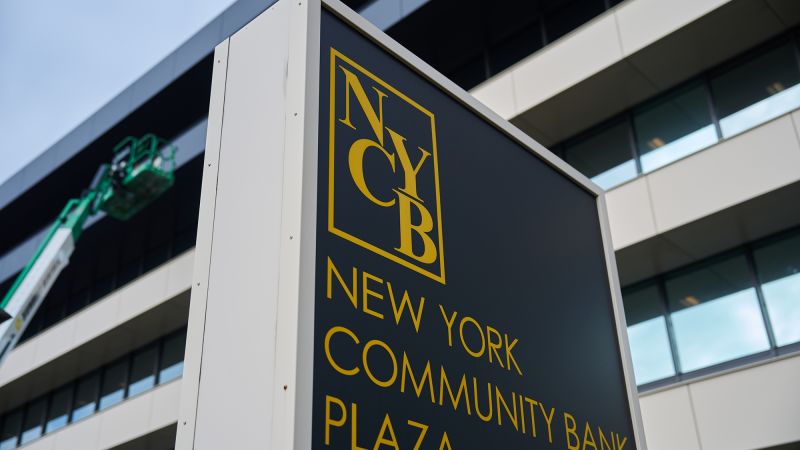Troubled regional lender New York Community Bancorp attempted to reassure investors Wednesday that it has enough liquidity to stay afloat after the stock shed about 60% of its value over the past eight days and Moody’s Investors Service downgraded the bank’s credit grade to junk.
“The challenge today is not easy. But this company has a strong foundation, strong liquidity and a strong deposit base, which gives me confidence for our path forward,” Alessandro DiNello, the bank’s new executive chairman, said on a call with investors Wednesday morning.
DiNello said that NYCB has seen “virtually no deposit outflow” from its retail branches in recent weeks.
The bank announced earlier on Wednesday that it had appointed DiNello, formerly the president of Flagstar Bank, to the position effective immediately. NYCB (NYCB) purchased Flagstar in December 2022. The Hicksville-based bank also said it has plans to bring in a new chief risk officer and chief audit executive.
“Overall deposits are up from around 2023, as all areas of the company have performed strongly, including our private banking and mortgage teams,” said DiNello on the call. “We are already in a strong liquidity position … And we are committed to building liquidity further.”
Still, investors weren’t convinced. shares of the stock fell an additional 6% on Wednesday morning.
The bank holds total deposits of approximately $83 billion, the lender said in a statement Tuesday evening. About $22.9 billion of those are uninsured. NYCB’s total liquidity of $37.3 billion, they said, exceeds uninsured deposits with a coverage ratio of 163%.
“Despite the Moody’s ratings downgrade, our deposit ratings from Moody’s, Fitch and DBRS remain investment grade,” wrote Thomas Cangemi, NYCB’s president and CEO, in the statement. “The Moody’s downgrade is not expected to have a material impact on our contractual arrangements.”
DiNello added on Wednesday that the $116 billion lender would work to reduce its concentration in the commercial real estate market. Office and retail property valuations have been falling since the pandemic changed where people live and work and how they shop. The Federal Reserve’s efforts to fight inflation by raising interest rates have also hurt the credit-dependent industry — and that has been bad news for regional banks.
US banks hold about $2.7 trillion in commercial real estate loans. The majority of that, about 80%, according to Goldman Sachs economists, is held by smaller, regional banks — the ones that the US government hasn’t classified as “too big to fail.”
It’s been nearly a year since the collapse of three US regional lenders left financial institutions and regulators scrambling to prevent the spread of a banking crisis. Today, investors are worried they’re back on familiar territory.
But while the last crisis was all about interest rate risk, this one revolves around the $20 trillion commercial real estate market.
Fears were exacerbated last week when NYCB reported a surprise loss of $252 million last quarter compared to a $172 million profit in the fourth quarter of 2022. The company also reported $552 million in loan losses, a significant increase from $62 million the prior quarter. The increase was driven partly by expected losses on commercial real estate loans, it said.
The sudden plummet in stock price and downgrade by Moody’s led to worries of a bank run by uninsured deposits — those with more than $250,000 in their accounts.
Those customers represented around 40% of NYCB’s total deposits as of the third quarter of last year, according to the company’s earnings filing. That’s a considerably smaller share compared to Signature Bank and Silicon Valley Bank shortly before their demises.
Regulators remain ‘focused’
The Federal Reserve is “paying attention very closely” to the stress facing New York Community Bancorp, Minneapolis Fed President Neel Kashkari said Wednesday.
He added that most banks under pressure lately aren’t experiencing problems across the board with commercial real estate loans, but rather that it is concentrated in the office sector.
“We think it’s going to be on a bank by bank basis where we see pressures flare up, and our bank supervisors are in very close contact with other supervisors around the country, and of course, with bank management to monitor their portfolios,” Kashkari said in an interview with CNBC Wednesday morning.
He also said he’s not currently concerned about contagion effects and pressures appear to be “idiosyncratic to individual banks with individual exposures.”
Treasury Secretary Janet Yellen told lawmakers Tuesday: “I do have a concern about commercial real estate.”
Her comments came during testimony before the House Financial Services Committee hearing. She noted that some cities have been hit by the surge in empty office buildings.
Yellen said bank regulators are “quite focused” on this problem, including by working with banks to manage risks, build up reserves to cover losses, adjust dividend policies and maintain liquidity.
“I’m concerned. I believe it’s manageable, although there may be some institutions that are quite stressed by this problem,” Yellen said.
This story is developing and will be updated.
Read the full article here




